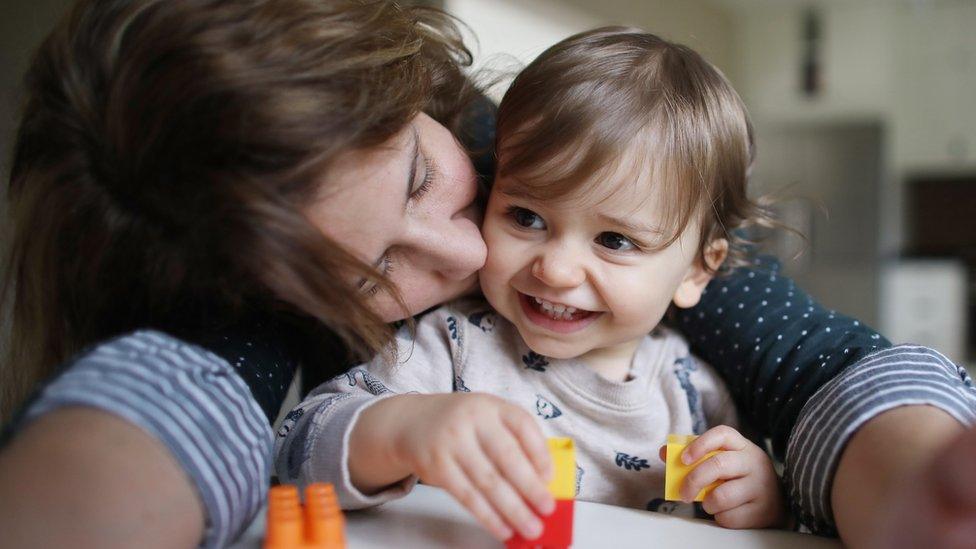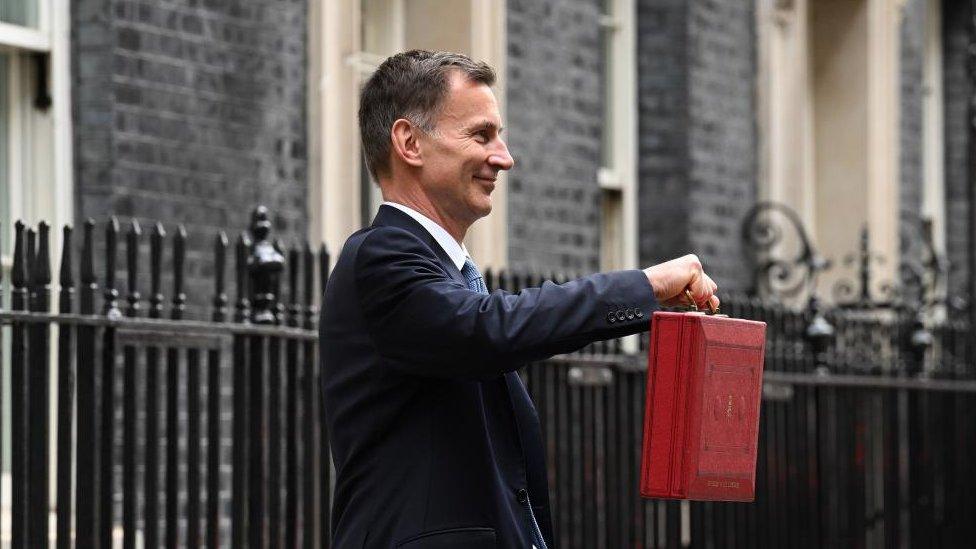Childcare costs: Average yearly fee for one child hits £10k
- Published
- comments

The recent rise in national living wage means childcare costs are likely to go up even further for parents.
The average cost of a full-time childcare place in Northern Ireland is now more than £10,000 a year for one child, new figures suggest.
The organisation Employers for Childcare carried out a survey of 2,000 households in Northern Ireland.
It found that one in four families paid more than £1,000 a month for childcare, with some paying up to £3,000.
Childcare providers are also struggling, with 84% reporting they are just breaking even or making a loss.
Employers for Childcare has been tracking the affordability of childcare since 2010, but this is the first survey since the Covid pandemic.
It showed an increase of 14% in childcare costs since 2021.
'Sums aren't adding up'
Aoife Hamilton from the organisation said the average cost of a full-time childcare was more than double the annual student fee for undergraduates at Queen's University Belfast - currently £4,750 for students who normally live in Northern Ireland.
"It's more than the maximum amount which can be put through schemes such as tax free childcare," she added.
She said this was prompting families to consider whether both parents could afford to work as the sums were not adding up for working families.
"88% of parents told us they have had to change their work arrangements due to the cost of childcare - including reducing their hours and, in some cases, leaving work altogether," she said.
"Parents with dependent children make up more than 40% of our workforce and are employed across all sectors."
Speaking to the BBC's Good Morning Ulster Programme, Ms Hamilton called on government to "step in and do something".
She said that current support available to parents "simply isn't enough for many many families" and "does nothing for the rising costs for child care providers".
"We need an executive back up and running making childcare a day-one priority," she said.

Christopher Eisenstadt and his three-year-old son, Harvey.
Christopher Eisenstadt said both he and his wife were "decent earners" but even they found it could be a real struggle, especially in months like December when there were lots of other costs.
Before his son three-year-old son Harvey started nursery, he was paying about £1,000 a month - now it is closer to £800 a month.
"Both me and my wife have professional jobs, if we were closer to the minimum wage it would be very hard to argue that it would make sense to work full time, especially if you have more than one child," the east Belfast dad said.
"We only have Harvey, we're able to make it work but if we had another child, absolutely no way could we afford two full time places on the amount of money we make.
"If we're struggling, I don't know how people do it."
'Stuck between a rock and a hard place'
The rising cost of living means he is already spending more on energy and had to renew his mortgage, before that childcare was nearly double the cost of the couple's mortgage.
"There's no easy way of doing this. Giving up a second salary is not always feasible, you're stuck between a rock and a hard place," he said.
Recent announcements about the national living wage rising to £11.44 an hour in April means it is likely there will be further childcare cost increases in 2024.
Sharon Malcolm, who manages Puddleducks day nursery in Belfast city centre, said that rise would have a "detrimental" effect on its staff costs, which are spiralling.
"The minimum wage is desperately needed. Our teams absolutely deserve the minimum wage and more but we have no other way of covering that without passing it on to our parents," she said.
'Our hands are tied'
Puddleducks has already put up its prices in 2023 and expects to have to do so again in 2024.
"The cost of everything, heating, food, supplies, resources for our children, everything is increasing drastically," she said.
"Childcare providers don't have any other source of income than the fees that our parents pay, so our hands are tied, any additional costs we have to pass on to our parents."
"We remain the only part of the UK and Ireland that doesn't have a childcare strategy in place, we are the only part of the UK and Ireland that doesn't have a government that supports the childcare sector."
Related topics
- Published11 May 2023

- Published15 March 2023
